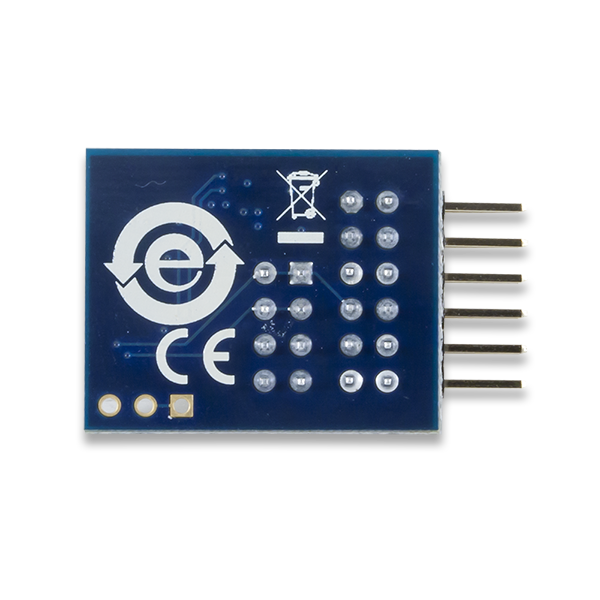Pmod ACL Reference Manual
The Digilent Pmod ACL (Rev. E) is a 3-axis digital accelerometer module powered by the Analog Devices ADXL345.
Download This Reference Manual
Features
- 3-axis, ±2/4/8/16g accelerometer
- User-selectable resolution
- Activity/inactivity monitoring
- Single/double-tap and free-fall detection
- Small PCB size for flexible designs 1.0 in × 0.8 in (2.5 cm × 2.0 cm)
- 12-pin Pmod port with SPI interface and 2×4-pin I²C interface
- Follows Digilent Pmod Interface Specification Type 2A
- Library and example code available in resource center
Functional Description
The Pmod ACL utilizes Analog Devices ADXL345 to provide high resolution acceleration changes including inclination changes of less than 1.0°. With free fall and single/double tap detection capabilities, the Pmod ACL can be configured to take measurements on the user's whim.
Interfacing with the Pmod
The Pmod ACL communicates with the host board via the SPI protocol or the I²C protocol. SPI communication is enabled when the Chip Select line is driven low; conversely, the I²C protocol is enabled when the Chip Select line is driven to a logic level high voltage. An interrupt can be triggered whenever a measured axis acceleration data is over a user defined threshold limit. A data stream setting the threshold activity to a value of 250 mg and Interrupt 1 to be triggered whenever the X and Y axis exceeds the threshold level through SPI is provided below:
| Read/~Write | Multi-byte | 6-bit Threshold Activity Address | |||||
|---|---|---|---|---|---|---|---|
| 0 | 0 | 1 | 0 | 0 | 1 | 0 | 0 |
| 8 bits of Threshold Activity data (62.5 mg/LSB scale) | |||||||
| 0 | 0 | 0 | 0 | 0 | 1 | 0 | 0 |
| Read/~Write | Multi-byte | 6-bit Activity/Inactivity Control Address | |||||
| 0 | 0 | 1 | 0 | 0 | 1 | 1 | 1 |
| Activity/Inactivity Control Settings | |||||||
| ACT ac/dc | ACT X | ACT Y | ACT Z | INACT ac/dc | INACT X | INACT Y | INACT Z |
| 0 | 1 | 1 | 0 | 0 | 0 | 0 | 0 |
| Read/~Write | Multi-byte | 6-bit Interrupt Enable Address | |||||
| 0 | 0 | 1 | 0 | 1 | 1 | 1 | 0 |
| 8 bits of Which Interrupt Sources Are Enabled | |||||||
| Data Ready | Single Tap | Double Tap | Activity | Inactivity | Free Fall | Watermark | Overrun |
| 0 | 0 | 0 | 1 | 0 | 0 | 0 | 0 |
Once an interrupt has been generated, users may read the data registers (0x32 - 0x37) for the 10 bits of two's complement data in the X, Y, and Z axes, respectively. The data in the two registers for each axis is right justified with sign extensions as the leading 6 bits. Reading the Interrupt source register (0x30) clears the activity interrupt bit D4.
Users may also follow the given example code functions and demonstration to start collecting accelerometer data.
Pinout Description Table
| Pmod Header J1 | Pmod Header J2 | |||||||||
|---|---|---|---|---|---|---|---|---|---|---|
| Pin | Signal | Description | Pin | Signal | Description | Pin | Signal | Description | ||
| 1 | ~CS | Chip Select | 7 | INT2 | Interrupt 2 | 1, 5 | SCL | Serial Clock | ||
| 2 | MOSI | Master-Out-Slave-In | 8 | INT1 | Interrupt 1 | 2, 6 | SDA | Serial Data | ||
| 3 | MISO | Master-In-Slave-Out | 9 | NC | Not Connected | 3, 7 | GND | Power Supply Ground | ||
| 4 | SCK | Serial Clock | 10 | NC | Not Connected | 4, 8 | VCC | Positive Power Supply | ||
| 5 | GND | Power Supply Ground | 11 | GND | Power Supply Ground | |||||
| 6 | VCC | Power Supply (3.3V) | 12 | VCC | Power Supply (3.3V) | |||||
Any external power applied to the Pmod ACL must be within 2.0V and 3.6V; it is strongly recommended that Pmod is operated at 3.3V.
Physical Dimensions
The pins on the pin header are spaced 100 mil apart. The PCB is 1 inch long on the sides parallel to the pins on the pin header and 0.8 inches long on the sides perpendicular to the pin header.
Additional Information
The schematics of the Pmod ACL are available here. Additional information about the accelerometer including communication modes and specific timings of the chip can be found by checking out its datasheet here.
Example code demonstrating how to get information from the Pmod ACL can be found here.
If you have any questions or comments about the Pmod ACL, feel free to post them under the appropriate section (“Add-on Boards”) of the Digilent Forum.




